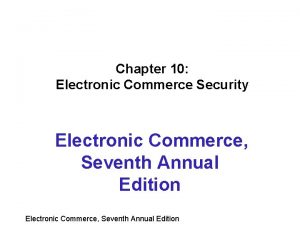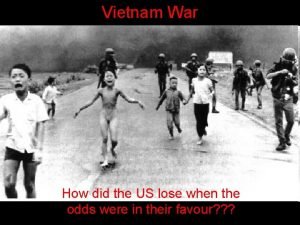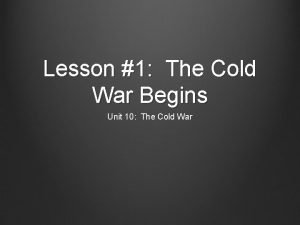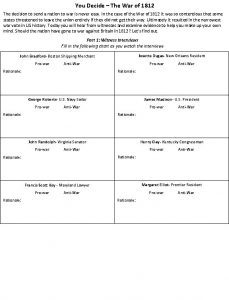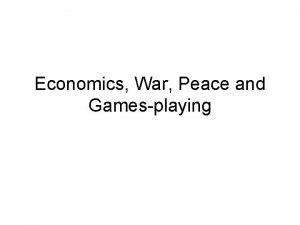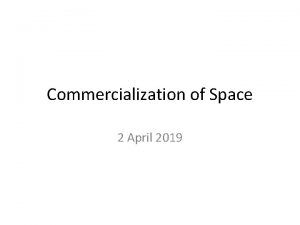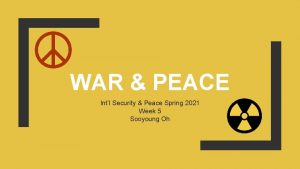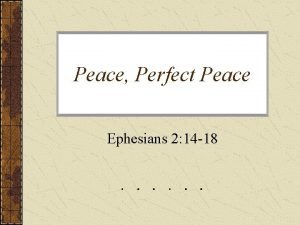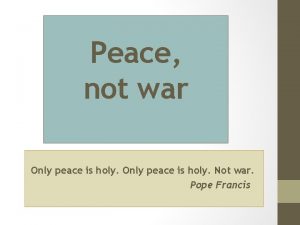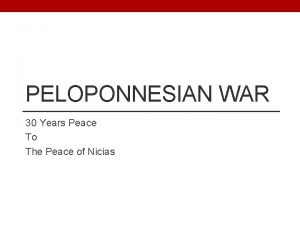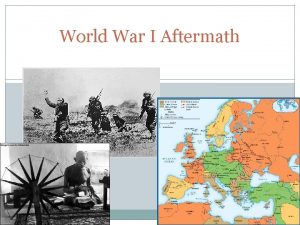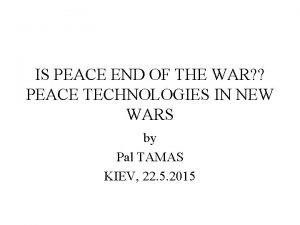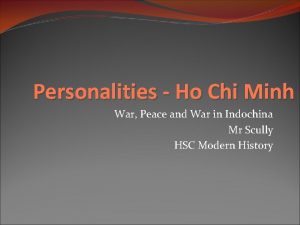THE COMMERCIALIZATION OF SECURITY IN WAR AND PEACE



















- Slides: 19

THE COMMERCIALIZATION OF SECURITY IN WAR AND PEACE Introduction to SAMPOL 208 Spring 2015 ase. ostensen@isp. uib. no

THE PLAN What is security? Security and the state The market for security and military services (X 2) Driving forces. Commercialization in weak versus in strong states Governing security. Theoretical perspectives The commercialization of policing The commercialization of war (X 2) Outsourcing security and democracy? Outsourcing peace (peace ops, peace building and development)

WHAT ARE WE GOING TO STUDY? • The concept of security and • The market for security (in different settings and shapes) • The governing of security • Implications

WHY STUDY THE COMMERCIALIZATION OF SECURITY? • A game changer for the state monopoly on violence (the core task of the state)? • Introduces new ways of governing security • Has implications for: - who is to provide security - who is to be secured and by which means etc. It has implications for how we understand security The last frontier of the privatization/ outsourcing paradigm?

- Demonstrate knowledge of the role of the state as security provider, its historical developments and its different contemporary manifestations. - Account for some of the political and historical mechanisms that has facilitated a worldwide market for security and military services. - Display solid knowledge of different types of commercial security outfits, the main characteristics of the market for security services, both in weak and strong states, as well as in contexts of peace and violent conflict. - Compare the commercialization of security in selected countries ranging from Norway, the United Kingdom, and the United States to countries like South Africa, Kenya and Afghanistan. - Demonstrate command of different theoretical approaches to understanding the commercialization of security and the various consequences that these theories imply. - Discuss implications of the commercialization trend in relation to democratic and legal accountability, as well as the state monopoly of legitimate use of violence and civilmilitary relations.

HOW? Self-study Lectures Discussions Take home exam

WHAT IS SECURITY? The concept may be understood in many ways It is tightly coupled to power, why? In political science the concept was long «monopolized» by realist theorists and scholars and coupled to military force Security versus safety Is it an «essentially contested concept» ?

When using the security concept it can be useful to define it according to a list of questions such as: -Security for whom - Security from what - For which values - How much security - By what means - At which costs - In the long or short run? - etc.

WHAT IS SECURITY? Objects of security: • The term security was long understood as state international relations realist thinking. security, especially in • From the mid-1990 s: the term «Human Security» emerged • Had a political dimension (as usual) • Introduces the focus on individuals irrespective of state affiliation. • The change of objects from states to humans is widely reflected in liberal thinking, including in the development of peace operations (R 2 P).

Scope: From freedom from violence to a much broader understanding No agreed definition, but is often defined in terms of «freedoms» : “human security underscores the universality and interdependence of a set of freedoms that are fundamental to human life: freedom from fear, freedom from want and freedom to live in dignity. As a result, human security acknowledges the interlinkages between security, development and human rights and considers these to be the building blocks of human and, therefore, national security (OCHA 2014)”




Roland Paris: “Human security may serve as a label for a broad category of research in the field of security studies that is primarily concerned with nonmilitary threats to the safety of societies, groups, and individuals, in contrast to more traditional approaches to security studies that focus on protecting states from external threats. » The point is: There has been a broadening of the security concept in terms of - Security for whom? - The source of the threat - > Who is to deliver security

SECURITIZATION THEORY The Copenhagen school (Ole Wæver) • The main idea is that an issue can be «securitized» , that is reconstructed into a matter of security. • This is done by so-called «speach acts» carried out e. g. by political actors • These speach acts «elevate» an issue from a political status to a matter of security. This moves the issue out of the political realm and into the security realm. • Once an issue is «securitized» it legitimizes extraordinary measures to be taken. • Securitzation is intersubjective – requires acceptance by the audience


THE RELEVANCE OF SECURITIZATION TO OUR TOPIC When security is outsourced it may be «professionalized» , limiting who gets to define what is security/ insecurity The outsourcing of security may mean that who gets to securitize changes The process of securitzation is highly political, has consequences for which desicions are made and which measures are used.

«THE RISK SOCIETY» • Ulrich Beck (1986) • Security is substituted by «risk» • Individuals act less according to tradition and we thus need to think for ourselves and reflect on the consequences of our actions • Risk stem from technology more often than nature and may be socially constructed • Perceptions of «risk» are growing, we are hyper-sensitive to risk • risk is often unobservable (as opposed to threats) and require expertise. • as a new fundamental societal organizing principle • The distinctins between internal risks and external are vanishing

THE RELEVANCE OF «THE RISK SOCIETY» TO OUR TOPIC • Opens up to a wider spectrum of «risk managers» but the state • These do «risk assessement» , «risk mitigation» • Offer commercial services to individuals and others who can pay – a result of the risk society • The private risk industry thus has also contributed to the rise of a world risk society in which the demand for security can never be satisfied.
 What is commercialisation in sport
What is commercialisation in sport Technology commercialization process model
Technology commercialization process model Commercialization ap human geography
Commercialization ap human geography Privat security
Privat security Chapter 29 wilsonian progressivism in peace and war
Chapter 29 wilsonian progressivism in peace and war War and peace ending
War and peace ending What does jesus say about war and peace
What does jesus say about war and peace Chapter 16 lesson 2 challenges to slavery
Chapter 16 lesson 2 challenges to slavery Wireless security in cryptography
Wireless security in cryptography Integrity in e commerce
Integrity in e commerce James madison war at home
James madison war at home Vietnam war
Vietnam war The cold war lesson 1
The cold war lesson 1 Presidential and radical reconstruction venn diagram
Presidential and radical reconstruction venn diagram Was john bradford pro war or anti war
Was john bradford pro war or anti war Ich war du
Ich war du Studyjams force and motion
Studyjams force and motion Why was the civil war the first modern war
Why was the civil war the first modern war Ich war du warst er sie es war
Ich war du warst er sie es war Sides of cold war
Sides of cold war









